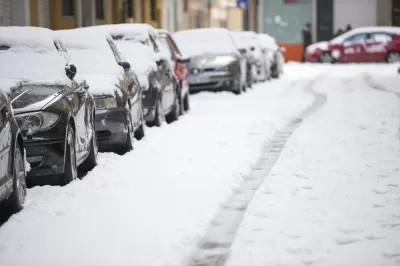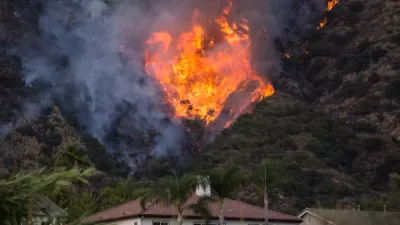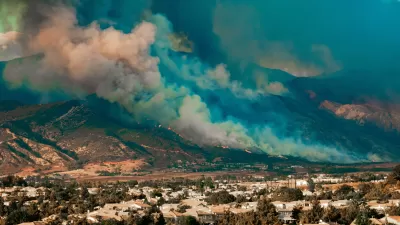After thousands of motorists spent over a day on a snowbound Virginia highway, experts are warning that auto-centric sprawl will worsen the impacts of extreme weather events.

The snowstorm that stranded thousands of drivers in Virginia for over a day has prompted a reevaluation of the auto-centric policies that led so many to become trapped on Interstate 95. "Local advocates say the region’s failure to invest even more broadly in multimodal options than it already has may have set up the area for its current disaster — especially in the most far-flung suburbs, where many of D.C.’s workers live," writes Kea Wilson.
Dan Malouff, a transportation planner based in northern Virginia, points to the potential for breakdown when suburban commuter traffic gets funneled into just one major corridor. According to Malouff, "multimodal networks with multiple modes and paths to choose from are inherently more resilient than putting all of civilization’s eggs in one basket."
Experts warn that a lack of walkability and access to reliable public transit will exacerbate the effects of extreme weather in other ways, too, writes Wilson. "In so much of the DMV suburbs right now, people are finding that they can’t even get groceries the moment that vehicular infrastructure starts to break down, to say nothing of commuting into work," says M. Nolan Gray, author of the forthcoming book, Arbitrary Lines: How Zoning Broke the American City and How to Fix It. Gray recommends promoting more "resilient, mixed-use neighborhoods" that will be better equipped to deal with extreme weather events.
FULL STORY: Virginia Snowstorm Nightmare Highlights Need For Better Transportation Policy

Planetizen Federal Action Tracker
A weekly monitor of how Trump’s orders and actions are impacting planners and planning in America.

Maui's Vacation Rental Debate Turns Ugly
Verbal attacks, misinformation campaigns and fistfights plague a high-stakes debate to convert thousands of vacation rentals into long-term housing.

Restaurant Patios Were a Pandemic Win — Why Were They so Hard to Keep?
Social distancing requirements and changes in travel patterns prompted cities to pilot new uses for street and sidewalk space. Then it got complicated.

Charlottesville Temporarily Has No Zoning Code
A judge ordered the Virginia city to throw out its newly revised zoning code, leaving permitting for new development in legal limbo.

In California Battle of Housing vs. Environment, Housing Just Won
A new state law significantly limits the power of CEQA, an environmental review law that served as a powerful tool for blocking new development.

Boulder Eliminates Parking Minimums Citywide
Officials estimate the cost of building a single underground parking space at up to $100,000.
Urban Design for Planners 1: Software Tools
This six-course series explores essential urban design concepts using open source software and equips planners with the tools they need to participate fully in the urban design process.
Planning for Universal Design
Learn the tools for implementing Universal Design in planning regulations.
Heyer Gruel & Associates PA
JM Goldson LLC
Custer County Colorado
City of Camden Redevelopment Agency
City of Astoria
Transportation Research & Education Center (TREC) at Portland State University
Jefferson Parish Government
Camden Redevelopment Agency
City of Claremont





























